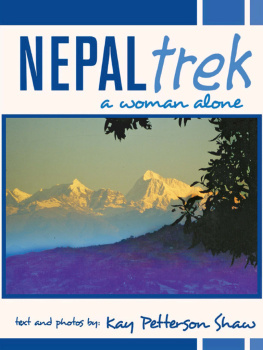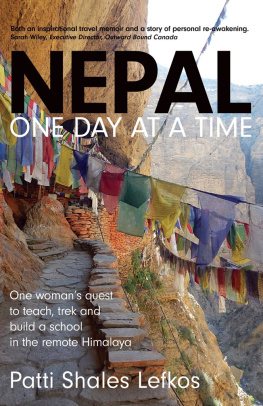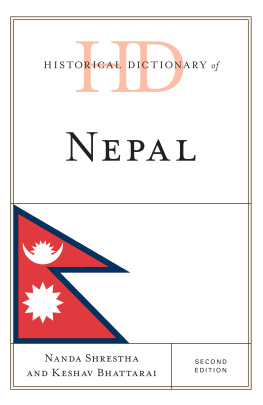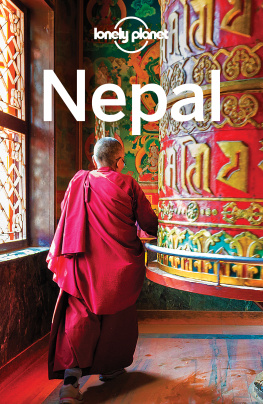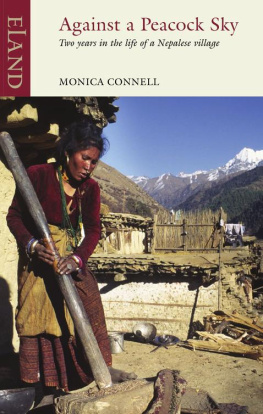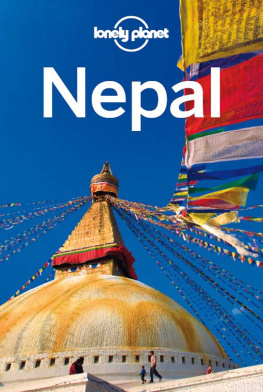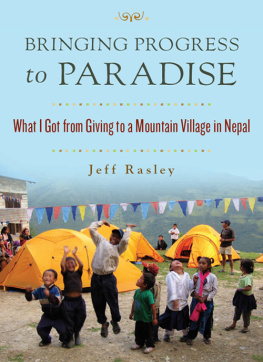Keep up to date with books by Fiona Roberts at:
www.spanglefish.com/fionaroberts
Chapter One
At the time of writing this book Nepal is jostling for the inauspicious position of twelfth on the list of the worlds poorest countries.
Having been there or thereabouts for many years on the scale of the haves and the have nots, Nepals present position doesnt look like changing anytime soon not for the better, at least.
Tod and I are not so blinkered and unaware of humanitys myriad problems that we knew nothing of the plight of the impoverished, as they struggle to simply exist in so many parts of the globe today. But it was not until we actually went to Nepal and spent time there that the on the ground reality of being so poor as a nation really struck home with us.
That which we take for granted everyday, never giving it a second thought, often simply just does not exist in Nepal and if it does, it can seem something of a sad parody.
For example, there is electricity in the capital city of Kathmandu, but only for a maximum of eight hours in every twenty-four, and then often late at night. Imagine trying to run a business under those conditions.
There is a public water supply system in Kathmandu, but this is usually only turned on once a week for a short time. Unless you have a water-storage tank you are at the mercy of the standpipes, and will have to fill your containers with the often filthy water which needs to be boiled before it is safe to drink. And did I mention that in many areas the standpipes are turned on at 2am? Unsurprisingly, I suppose, an increasing number of the population are being struck down by waterborne diseases.
The pursuit of money takes on added significance in a country where there is so little of it, and of course human nature running sadly true to form, corruption and dishonesty will follow as a result, closing their callous, grasping fists around whatever they can reach.
I mention this because on our second trip to Nepal Tod and I became very much aware of, and indeed involved in some of the sadder consequences of the darker side of human nature.
In 2009 we spent five months in Nepal, most of that time living in the small, isolated village of Salle (pronounced Solley) high up in the Himalayas, not far from Everest Base Camp. We went there to teach English.
We also spent time in Kathmandu, braving the somewhat, nay definitely, perilous journey back to the capital, occasionally scrambling over landslides along the way, and frequently being thrown around in micro buses for ten or more hours at a time, whilst being deafened by the worlds loudest music. Oh joy!
We were lucky enough to visit Tibet too, and I shall be eternally grateful to that incredible country for providing me with the opportunity to shout gleefully, and at the top of my voice, Yippee! Yaks! as I stood at the edge of a vast, silent swathe of flat valley floor which stretched far away into the misty distance, and through which a crystal-clear river meandered peacefully.
Not a single yak paid me the slightest attention. They just munched and meditated, at one with that astonishing landscape at the top of the world.
Peaceful creatures, yaks.
We were completely smitten with the inhabitants of Salle adults, children and animals alike and our return trip to Nepal was designed specifically to see them all again. We wanted to take presents to them.
The village of Salle is situated along one steep side of a valley in the Everest region of Nepal, about 200km north east of Kathmandu.
The village itself remains today much as it has been for many hundreds of years, and the villagers carry on their lives in much the same way as their grandparents did, and as their grandparents did before them.
They grow crops on the flat terraces that they have cut out of the steep valley sides potatoes, maize and corn. They eat the potatoes, feed the corn to the chickens, and use the maize to make raxi, the local lip-burning firewater.
We also saw some very strange-looking squash plants growing wild. They grew as big as triffids in a frighteningly short space of time, and although the villagers didnt actually cultivate them they did pick and eat the squash.
(For a much fuller description of village life please see our first book!)
Few outsiders, and even fewer white people have ever set foot in Salle.
For sure that has a lot to do with its remoteness and inaccessibility, and I must admit there were times when I thought I was not going to be able to set foot in Salle, as I puffed and wheezed, gasped and sweated, slid and tripped all the way up the mountain and down into the valley.
If Im honest I think I may never have reached the village on several occasions had it not been for the gallant efforts of Tod and Kalyani. Their combined pushing, pulling, and nifty grabbing of my flailing arms and other parts of my anatomy kept me attached, albeit perilously, to the side of the mountain, and prevented me from plummeting down to the valley floor considerably faster, and with much greater ease than I had come up.
During all their hard work I never heard a single word of reproach from either of them, although I did catch a couple of exchanged glances featuring eyes rolled upwards. I pretended not to notice. I knew where my interests lay.
Kalyani was the young headmistress of the Junior school where we taught English. It is about an hours trek away from the village through the still, silent forest that breathes down your neck, muffles your footsteps, and makes you want to whisper.
There surely has never been a more spectacular setting for a school. I say school and most of us think of rather dingy brick-built constructions, but this school consists of two large, one-story wooden huts, divided into five classrooms, inside which you will find bare wooden tables and rough wooden benches. Not a mod con in sight, only a blackboard and chalk. There is no electricity, no water, and no toilet.
The huts stand on the sun baked clay of a massive, flat clearing high up in the forest, and the view from that point never ceased to take our breath away.
Across the valley, seeming almost close enough to touch, their steep sides clothed in green forest, and their peaks thickly capped with gleaming, glinting snow, stood a mighty range of mountains. On just two occasions we were privileged to see the habitual thick wall of cloud behind these mountains disperse, revealing the awesome Everest range.
The children come from miles around to attend the school, and to reach it a trek of anywhere between thirty and sixty minutes through the forest and up the mountain is considered normal. They love their school, not because it is situated in one of the worlds most beautiful spots, but because it provides them with an education. Even at their young ages they know that they are lucky. Truancy is non-existent how cool is that? Late attendance may sometimes happen because it took longer than expected to feed the animals, cut the wood, or fetch the water.
Kalyani, at twenty, is the youngest headmistress Ive ever met. She looked after us during our stay in Nepal nothing was too much trouble for her where we were concerned. Amongst other things, she hated to see us carrying anything and would simply grab whatever it was maybe a rucksack or a pile of exercise books and trot off with it up or down a mountain, ignoring our protestations. She became known as our Pack Ant, this being a reference to the fact that she was small (barely five-feet tall) but very strong and active. She is actually something akin to a small human dynamo.
Next page


